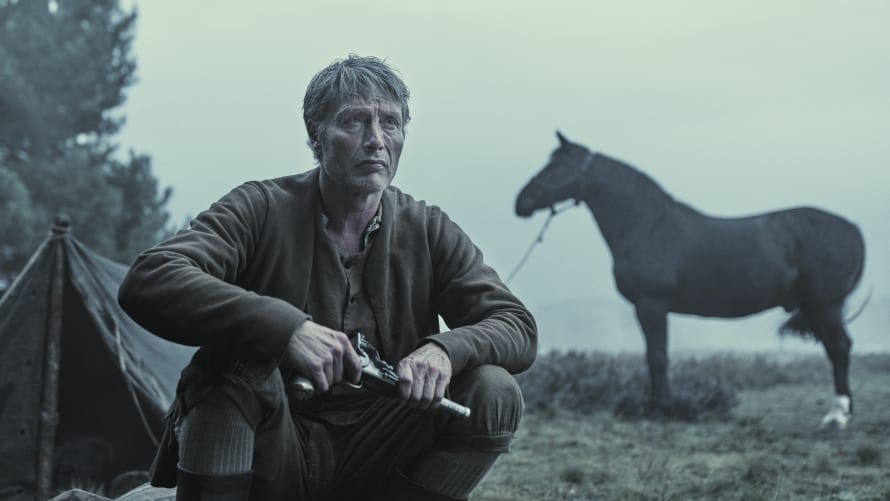A ravishing mix of the brutal with the sublime, Nikolaj Arcel's sweeping historical epic offers a gripping take on blind ambition, greed and the transformative power of love.
Based on a true story, The Promised Land delivers an old-fashioned big-screen marvel made modern by the director's deep dive into the very excesses of genre conventions. Reuniting with Mads Mikkelsen (after 2012's Oscar-nominated A Royal Affair), Arcel crafts an unforgettable and timely tale of one man's fight against impossible odds.
In 18th century Denmark, Captain Ludvig Kahlen (Mikkelsen) sets out to tame a vast, uninhabitable heath in the Jutland region. He aims to fulfill his king's nationalistic aspirations and to realize his personal ambitions.
Characterized the Jutland region as a wild frontier, Arcel creates a setting that John Ford himself would salivate over. The filmmaker's direction effortlessly blends European costume melodrama into this Western-inspired saga of humanity's battle against natural elements.
Struggles pervade the very atmosphere of The Promised Land, with a plot teeming with conflict and intrigue at every turn. A proud but impoverished man, Kahlen is determined to vanquish his past to become a baron. However, his ambitions lead him to clash with a power-hungry feudal lord, Frederik de Schinkel (Simon Bennebjerg), who insists upon his claim of title over the Jutland territory.
The film quickly sets up a dichotomy between Kahlen and the upper class, but so too does it distinguish him from the those living on the margins of this society, as Kahlen becomes both outcast and taskmaster. At the same time, he manages to further enrage de Schinkel. Not only does the sadistic countryside ruler discover that Kahlen has been harbouring two fugitive tenant farmers, Johannes Eriksen (Morten Hee Andersen) and his wife Ann Barbara (Amanda Collin), but de Schinkel also soon realizes his own fiancée has fallen in love with the captain.
The film's basic but absolute divide between good and evil would normally result in eye-rolling clashes. What saves this story from descending into mawkish melodrama is the steadfast nature of the performances, especially from Mikkelsen. As Kahlen's nemesis, Bennebjerg's de Schinkel is cartoonish in his childish cruelty, but this is offset by the other characters — all good people whose influence changes Kahlen for the better.
Mikkelsen's understated but resonant performance is the grounding element to all the fantastical strands of this fable-like narrative, with the actor's ever-dependable steely gaze making it difficult to distinguish whether this obsessed individual's motives are entirely selfish. However, such an emphasis manages to suit the film's purposes well by aligning the viewer to his maddening drive.
Arcel pairs Mikkelsen's increasingly expansive performance to a visual strategy that opens the film up emotionally and tonally. The genius of the film lies in the fact that the director uses core filmic elements in a deceptively simple way that offsets the spiralling plot. The images are sumptuous and ripe with meaning. Cinematographer Rasmus Videbæk punctuates emotions and moods with the rich hues of the upper-class sphere and the earthy tones of Kahlen's domain. In each case, there's a painterly quality to the visuals, and the play of light and dark speaks volumes.
Through this masterful manipulation of form, The Promised Land rises above the excesses of its subject and the associated conventions. It reinvigorates both the historical period piece and the Western traditions by binding them together to create a more contemporary and urgent commentary on unchecked power and drive. In its interrogation of civilization versus barbarism, the film provides penetrating insight on the nature of true savagery. And it is in this context that it sets up an inspiring story of self-actualization.
